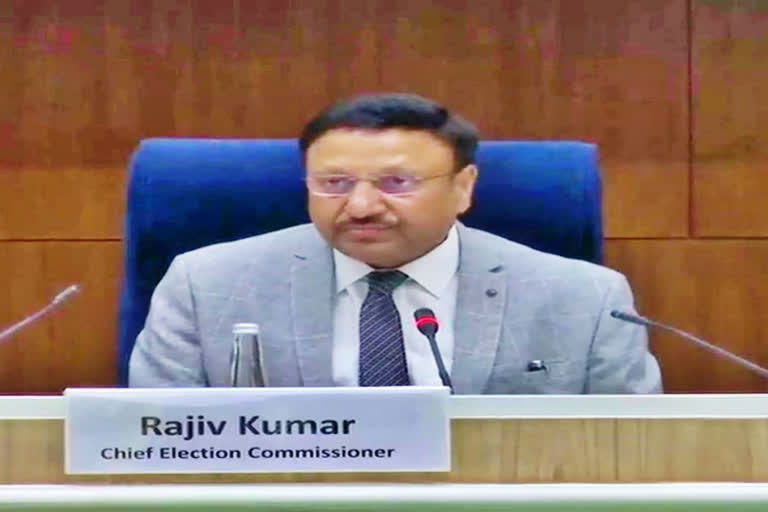New Delhi:The election for the President of India will be held on July 18 and the counting of votes will take place on July 21, the Election Commission of India (ECI) announced on Thursday. The electoral college of 4,809 members comprising MPs and MLAs is set to elect the successor to incumbent President Ram Nath Kovind.
Chief Election Commissioner (CEC) Rajiv Kumar, during a press conference here, noted that Kovind's term ends on July 24 and his successor should be elected before that. He said that the notification for the poll will be issued on June 15, and June 29 will be the last date for filing nominations. The date for the scrutiny of nominations is June 30 and the last date for the withdrawal of the candidatures is July 2.
Presidential polls to take place on July 18, counting of votes on July 21 So far no political party has named its choice for the top constitutional post. The president is elected by the members of the electoral college consisting of elected members of both houses of Parliament and elected members of the legislative assemblies of all states including the National Capital Territory of Delhi and the Union Territory of Puducherry. The nominated members of either Rajya Sabha and Lok Sabha or legislative assemblies of the states are not eligible to be included in the electoral college and therefore, they are not entitled to participate in the election.
Similarly, members of the legislative councils are also not electors for the presidential election. In 2017, the presidential polls were held on July 17 and the counting took place on July 20. "A total of 4,809 electors to vote in the Presidential elections 2022. No political party can issue a whip to its members," the CEC said.
Also read: Presidential elections: Will 2022 assembly poll victories ease the way for BJP?
On the issue of conducting free and fair elections, the CEC underscored that a separate pen will be given to all the candidatures at the time of voting and if anybody uses any other pen, his or her vote shall be deemed invalid. The voting takes place by means of a secret ballot through a single transferable vote.
CEC in a statement also mentioned that the Secretary-General of Rajya Sabha will be the Returning Officer. The nomination papers will have to be delivered to the Election Commission office, in New Delhi, and would need at least 50 members of the electoral college as proposers and another 50 as seconders. Any number below that shall be deemed invalid.
The President of India is elected by an electoral college that's formed by 776 parliamentarians and 4,120 legislators. The total strength of the electoral college is 10,86,431 votes. It is worthy to note here that the President of India is not elected directly as he/she is elected by the members of an electoral college. In 2017, Ram Nath Kovind had secured 65.35 percent votes in the Presidential polls to become the 14th president of India.
The presidential election schedule comes just a day before polls are held to fill 57 vacant Rajya Sabha seats across 15 states. Besides this, the poll panel has also directed to ensure the use of eco-friendly and biodegradable materials and eliminate the use of prohibited plastic/materials, as a part of its endeavour to make elections eco-friendly.
Article 324 of the Constitution, the Presidential and Vice-Presidential Elections Act, 1952, and the rules made thereunder vest the superintendence, direction, and control of the conduct of election to the office of the President of India.
